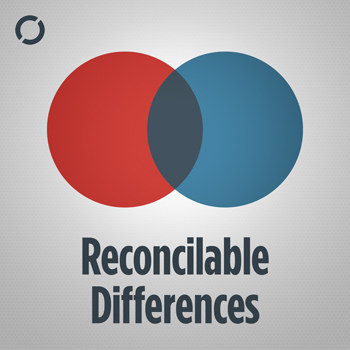Support this show
Get an ad-free version of the show, plus a monthly extended episode.#41: Jingling Keys
December 15th, 2016 · 180 minutes
Lots of follow-up on Free Will, including thoughts on Heisenberg, tail-chasing, and provocative recent scholarship on whether what we see is “reality.” Around 01:45:00, we fire off the spoiler horn for a discussion of season 1 of HBO’s Westworld.
This episode of Reconcilable Differences is sponsored by:
- Squarespace: Enter offer code DIFFS at checkout to get 10% off your first purchase.
- Foot Cardigan: Fantastic socks delivered to your mailbox every month. Get 10% off any subscription plan with the code DIFFS
- Away: Travel smarter with the suitcase that charges your phone. Get $20 off with the code ‘diffs’.
Stream this episode
Links and Show Notes
This week kicks off with some contentious claims that Merlin is a crammer and John is a monster. Merlin reminds John that he is out of his depth, and John remembers things. Also, some brief talk on Apple router alternatives and learning to tolerate morning notifications.
A mini-topic spins out of listener feedback: what’s the distinction between being clever versus being smart? This leads to an exploration of humor, creativity, and the attraction of trying to make the right joke at the right time.
(Recorded on Tuesday, December 6, 2016)
Mr. Show - "Pre-Taped Call-In Show"
Alessia Cara – How Far I'll Go (Radio Version) Lyrics | Genius Lyrics
"See the line where the sky meets the sea? It calls me…"
Biz Markie - Just A Friend (Official Video) - YouTube
Donald Hoffman: Do we see reality as it is? | TED Talk | TED.com
Cognitive scientist Donald Hoffman is trying to answer a big question: Do we experience the world as it really is ... or as we need it to be? In this ever so slightly mind-blowing talk, he ponders how our minds construct reality for us.
090 - Reality - Donald Hoffman — You Are Not So Smart — Overcast
Hoffman has developed a new theory of consciousness that, should it prove true, may rearrange our understanding of reality itself. Listen as Hoffman talks about the bicameral mind, the umwelt, and the hard problem of consciousness in this mindbending episode about how we make sense of our world, our existence, and ourselves.
The Interface Theory of Perception. - PubMed - NCBI
The Case Against Reality - The Atlantic
A professor of cognitive science argues that the world is nothing like the one we experience through our senses.
Cosmos on Nautilus: Extraterrestrials May Be Robots Without Consciousness
Humans may have one thing that advanced aliens don’t: consciousness.
Donald Hoffman: Do we see reality as it is? | TED Talk Subtitles and Transcript | TED.com
Donald D. Hoffman | University of California, Irvine
Cosmos, Consciousness & Meaning TV Series on PBS - Closer to Truth
The Act of Creation - Wikipedia
Koestler's fundamental idea is that any creative act is a bisociation (not mere association) of two (or more) apparently incompatible frames of thought.
Maria Bamford's One-Hour Homemade Christmas Stand-up Special - YouTube
John's Westworld/Moana YouTube video
Westworld (TV Series 2016– ) - IMDb
Rules of Fair Play | Seattle Mystery Bookshop
In 1930, during the Golden Age of Detective Fiction, a number of famous British writers (Christie, Sayers, Chesterton, and Orczy to name a few) formed the Detection Club. During one of their dinners they wrote the rules of fair play. These rules were meant to allow the reader a fair chance of figuring out who committed the crime before the end of the story. While the rules have relaxed a bit over the years they are still relevant in mystery writing today.
The Incomparable | Team Killer Robot (Episode 330)
Get your cowboy hat and your favorite Radiohead playlist, because it’s time to venture into the park for our first-season review of HBO’s “Westworld.” Is Anthony Hopkins running Westworld the park or “Westworld” the show we’re watching? Why can’t the Man in Black take a hint? Who is good and who is evil? Are the hosts sympathetic characters or empty, scripted shells? (And can’t you ask that question that about any fictional character?) We provide some quick analysis and also ponder where the show might take us in season two.
Unjustly Maligned | "Clue" with John Cecil (Episode 67)
Was it John Cecil, in the loft, with the microphone? Actually, yes — and that’s more straightforward than anything in the puzzling murder-mystery-comedy-movie-of-the-board-game “Clue”, which John’s here to defend. Would anyone care for fruit, or dessert?
